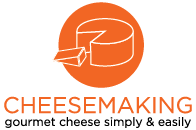A brief overview of what is good milk for making cheese.
Ideally the milk used to make cheese should be pasteurised not homogenised. You can get this milk in many locations across Australia, and while it is becoming more readily available, unfortunately it is not available in all locations across Australia. Pasteurised/homogenised milk can be used to make soft lactic cheeses, yoghurt and fresh cheeses such as ricotta but with most styles of cheese, pasteurised/homogenised milk makes a lower quality cheese than milk that has just been only pasteurised. Long Life Milk and Extended Shelf Life is also not suitable for making cheese.
When handling milk for cheesemaking think of: Fresh and Cold. Use the freshest milk that you can get and keep it cold or chilled during transport and storage. Don’t leave your cheesemaking milk in the boot of the car unchilled. We all know that milk is perishable, the reason being that undesirable bacteria and enzymes are still growing in pasteurized milk. They are eating the fats, proteins and sugars as their food and produce off flavors in the milk as a result. They are in very low numbers in fresh cold milk, but the longer the milk ages or the warmer the milk gets, the more these undesirable organisms grow and the more off flavors will develop. This results in a lower quality of milk to make your cheese.
You will notice that some pasteurised milks develop a hardened cream layer on the top. It’s called cream plugging. There are several reasons for this that I will not go into now. The plug is not all of the cream in the milk it is only some of it. If you have cream plugging in your milk it is still fine to use but unfortunately it is difficult to incorporate the plugged cream back into the milk. Always give the bottle a gentle shake to mix in what cream you can but vigorous agitation is not necessary and is not good for the milk. If any clumps exist just carefully remove them.
When making cheese you need to keep detailed records to help you make your next batch. If commercial manufacturers keep records, so should home cheesemakers. As part of that record keeping, record where you got that milk from + its use by/best before dare + any anomalies such as cream plug or flavor differences.
